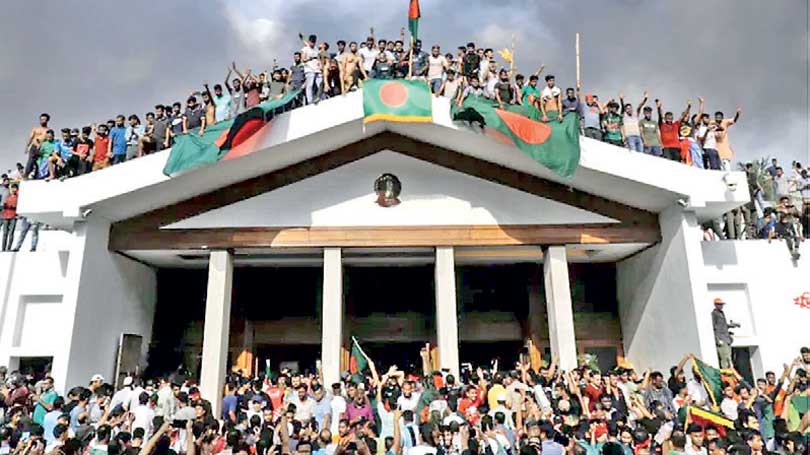Sunday Feb 22, 2026
Sunday Feb 22, 2026
Tuesday, 6 August 2024 01:10 - - {{hitsCtrl.values.hits}}

|
PM Sheikh Hasina |
Sheikh Hasina once helped rescue Bangladesh from military rule but her long rule came to a sudden end on Monday as protesters stormed her palace in Dhaka.
Her 15 consecutive years in power were marked by an economic rebirth but also by the mass arrest of political opponents and human rights sanctions against her security forces.
Protests began in July with rallies led by university students against civil service job quotas but soon escalated into deadly unrest and demands that she step down.
Attacks on demonstrators by police and pro-Government student groups last month also sparked international condemnation.
The autocratic Hasina, 76, won a fifth term as prime minister in January but the opposition boycotted, a vote it said was neither free nor fair.
Critics accused her Government of a litany of rights abuses, including the murder of opposition activists.
The daughter of a revolutionary who led Bangladesh to independence, Hasina presided over breakneck economic growth in a country once written off by US Statesman Henry Kissinger as an irredeemable “basket case”.
She promised last year to turn all of Bangladesh into a “prosperous and developed country” but around 18 million young Bangladeshis are out of work, according to Government figures.
Hasina was 27 and travelling abroad when renegade military officers murdered her father, Prime Minister Sheikh Mujibur Rahman, and her mother and three brothers in a 1975 coup.
She returned six years later to take the reins from her father’s Awami League party, beginning a decade-long struggle that included lengthy stretches of house arrest.
Hasina joined forces with Khaleda Zia’s Bangladesh Nationalist Party (BNP) to help oust Military dictator Hussain Muhammad Ershad in 1990. But they soon fell out and their ensuing rivalry dominated modern Bangladeshi politics.
Hasina first served as Prime Minister in 1996 but lost to Zia five years later.
The pair were imprisoned on corruption charges in 2007 after a coup by a military-backed Government. The charges were dropped and they contested an election the following year that Hasina won in a landslide. She had been in power ever since.
Zia, 78, is in poor health and confined to hospital after she was sentenced to 17 years in prison for graft in 2018, with top BNP leaders also behind bars.
Supporters have praised Hasina for leading Bangladesh through an economic boom, largely on the back of the mostly female factory workforce powering its garment export industry.
Bangladesh, one of the world’s poorest countries when it gained independence from Pakistan in 1971, has grown an average of more than six% each year since 2009.
Poverty has plummeted and more than 95% of its 170 million people now have access to electricity, with per capita income overtaking India in 2021.